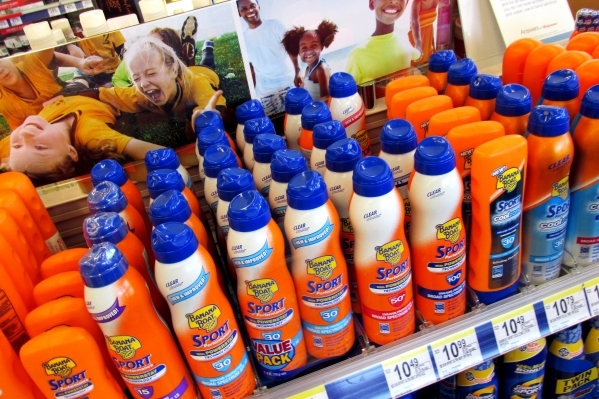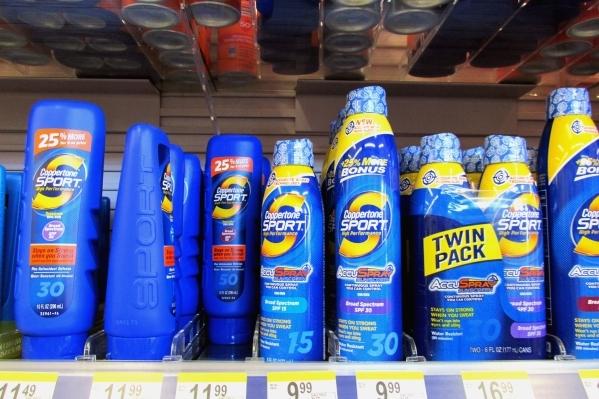Doctors say be generous with sunscreen
Shunning sunscreen due to potentially dubious ingredients may do you more harm than good.
That's Dr. Reuel M. Aspacio's point of view when it comes to protecting your skin from the sun's rays.
"The benefits outweigh the risk," said Aspacio, whose practice is at Summerlin Dermatology, 8310 W. Sahara Ave. "The key is to use a sunscreen regardless."
Certain ingredients in sunscreen are said to be hazardous. For example, products with a fragrance may contain parabens, which are preservatives that can negatively affect human hormones, according to the nonprofit Environmental Working Group.
The national organization, aimed at protecting human health and the environment, publishes an annual guide to sunscreens on its website at ewg.org.
The group also listed oxybenzone and retinyl palmitate as hazardous ingredients in some sunscreen products. Oxybenzone is said to be harmful to hormones, and retinyl palmitate, a fatty acid linked to vitamin A production, can increase the risk of skin cancer when exposed to the sun.
Still, ingredients that might be harmful should not deter people from wearing sunscreen, said Dr. Luke Blanchard of Las Vegas Skin & Cancer Clinics. In fact, Blanchard advises his patients to apply it in generous amounts.
"Cover up with a good coat," Blanchard said.
Aspacio offered similar advice.
"A lot of people don't use enough sunblock on a daily basis," he said.
Aspacio and Blanchard said they do not recommend certain brands over others but advise patients to make sure they are using broad-spectrum sunscreen, which protects against UVA and UVB rays.
UVB, or ultraviolet B, penetrates the upper layers of the skin, causing sunburn and aiding the body in vitamin D production.
UVA, or ultraviolet A, penetrates skin at a deeper level and can cause skin cancer.
"At the very least, you get the wrinkles, discolorations and the loss of elasticity," Aspacio said.
UVA rays also can penetrate car windows, unlike UVB rays, Aspacio said.
SPF, which stands for sun protection factor, protects skin only against UVB rays, so broad-spectrum protection is crucial, Aspacio and Blanchard said.
Aspacio advises his patients to use an SPF of between 40 and 50 because many do not apply sunscreen liberally enough, he said. Blanchard suggests using 30 SPF. The benefits of SPF level off once they surpass 50, Aspacio and Blanchard said.
Other than that, people should buy whichever product appeals to them, be it because of the way it smells or the way it feels, Blanchard said. Buying pricey brands is unnecessary, he added.
"Don't spend a lot of money because the cheap ones can work just as well as the expensive ones," Blanchard said. "Apply in generous amounts. That's why it's good to have a cheap one."
People who are opposed to wearing sunblock can wear protective clothing as an alternative, Aspacio said. They also can use titanium dioxide- or zinc oxide-based creams, Blanchard said.
"They're sunscreens, but they're a physical block rather than a chemical block," he said.
Aspacio said people can visit the American Academy of Dermatology's website at aad.org for more information about skin protection.
— To reach Henderson View reporter Cassandra Keenan, email ckeenan@viewnews.com or call 702-383-0278. Find her on Twitter: @CassandraKNews.


















